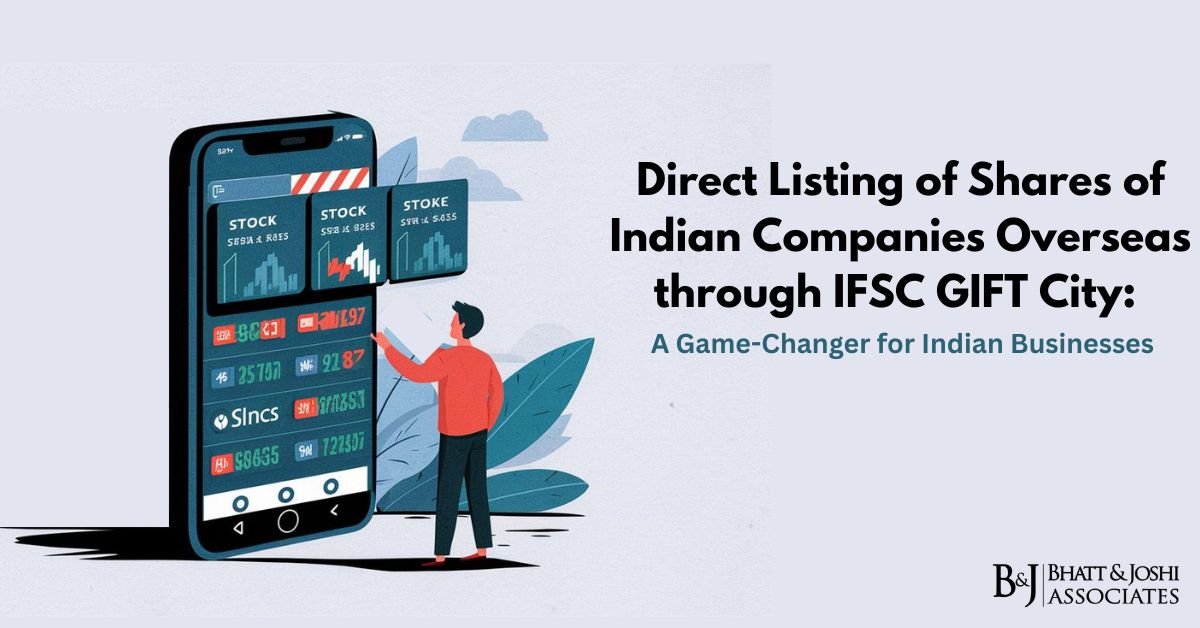Direct Listing of Indian Companies Shares Overseas through IFSC GIFT City: A Game-Changer for Indian Businesses

Introduction
The traditional route for Indian companies to access overseas markets involved the use of depository receipts, such as American Depository Receipts (ADRs) or Global Depository Receipts (GDRs). However, recent regulatory changes have paved the way for Indian companies to directly list their shares on overseas markets, particularly through the International Financial Services Centre (IFSC) a This article explores the implications of this significant development for Indian businesses.
Regulatory Provisions for Direct Listing of Indian Companies
The Companies (Amendment) Act, 2020 introduced provisions allowing for the direct listing of specified securities on permitted stock exchanges in foreign jurisdictions. These amendments, effective from October 30, 2023, were followed by the notification of the Companies (Listing of Equity Shares in Permissible Jurisdictions) Rules, 2024 (LEAP Rules) by the Ministry of Corporate Affairs (MCA) on January 24, 2024. Additionally, the Ministry of Finance amended the FEMA (Non-Debt Instruments) Rules, 2019, to accommodate the listing of shares abroad, effective from January 24, 2024.
Modes of Listing
Companies can opt to raise funds through fresh capital issuance or by offering existing shares for listing. Both methods are permissible under the LEAP Rules and NDI Rules. However, certain sectors are barred from raising foreign funds, and compliance with sectoral caps outlined in Schedule I to the NDI Rules is mandatory.
Eligibility Criteria for Direct Listing of Indian Companies
The LEAP Rules specify criteria for eligibility, excluding companies registered under section 8 or declared as Nidhi companies, those with negative net worth, or those in default with financial obligations. Similarly, the NDI Rules outline conditions for both unlisted and listed companies, focusing on factors such as regulatory compliance, default history, and ongoing investigations.
Permissible Holders and Investment Limits
Non-resident Indians and foreign entities are permitted to hold equity shares listed on permissible stock exchanges. However, individuals or entities from countries sharing a land border with India require Central Government approval. Permissible holders are subject to investment limits prescribed for foreign portfolio investors, ensuring regulatory compliance.
Sectoral Caps on Foreign Funds
The NDI Rules define sectoral caps dictating the maximum permissible foreign investment in specific sectors. Compliance with these caps is crucial for companies listing on permitted stock exchanges, as funds raised through IFSC listings contribute to overall foreign investment.
Pricing of Equity Shares
While the LEAP Rules do not specify pricing conditions, the pricing of equity shares listed on permitted stock exchanges must adhere to guidelines outlined in the Foreign Exchange Management Act, 1999. Pricing mechanisms vary depending on whether shares are issued by listed companies or offered by existing shareholders.
Compliance and Post-Listing Obligations
Unlisted public companies intending to list their equity shares on IFSC stock exchanges must file a prospectus with the Registrar of Companies (ROC) within seven days of finalization. Post-listing, companies must adhere to IFSC Regulations governing listing obligations and disclosure requirements, ensuring transparency and accountability.
Tax Incentives for Permissible Holders in Direct Listing
GIFT-IFSC offers a tax-neutral environment aimed at attracting global investors. Section 47(viiab) of the Income-tax Act, coupled with relevant notifications, exempts certain capital asset transfers on recognized stock exchanges within IFSC from taxation, provided consideration is paid in foreign currency.
Status After Listing
Despite listing on IFSC stock exchanges, companies do not attain the status of listed entities recognized by Indian regulatory bodies. However, they must comply with IFSC Regulations, particularly Chapter XI, pertaining to listing obligations and disclosure requirements.
Conclusion: Direct Listing Opens Global Growth Opportunities
The decision to permit direct listing of Indian company shares on overseas markets through IFSC GIFT City marks a significant milestone in India’s capital markets. This initiative holds immense potential to facilitate international expansion and enhance visibility for Indian businesses. However, addressing concerns related to eligibility criteria and post-listing obligations will be crucial to realizing the full benefits of this regulatory change. Overall, the move underscores India’s commitment to fostering a conducive environment for global capital flows and business growth.
 Whatsapp
Whatsapp

